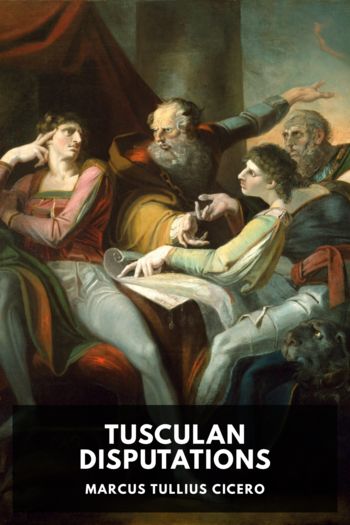Tusculan Disputations, Cicero [good book recommendations TXT] 📗

- Author: Cicero
Book online «Tusculan Disputations, Cicero [good book recommendations TXT] 📗». Author Cicero
But that what I propose to demonstrate to you may not rest on mere words only, I must set before you the picture of something, as it were, living and moving in the world, that may dispose us more for the improvement of the understanding and real knowledge. Let us, then, pitch upon some man perfectly acquainted with the most excellent arts. Let us present him for awhile to our own thoughts, and figure him to our own imaginations. In the first place, he must necessarily be of an extraordinary capacity, for virtue is not easily connected with dull minds. Secondly, he must have a great desire of discovering truth, from whence will arise that threefold production of the mind: one of which depends on knowing things, and explaining nature; the other, in defining what we ought to desire and what to avoid; the third, in judging of consequences and impossibilities, in which consists both subtlety in disputing and also clearness of judgment. Now, with what pleasure must the mind of a wise man be affected which continually dwells in the midst of such cares and occupations as these, when he views the revolutions and motions of the whole world, and sees those innumerable stars in the heavens, which, though fixed in their places, have yet one motion in common with the whole universe, and observes the seven other stars, some higher, some lower, each maintaining their own course, while their motions, though wandering, have certain defined and appointed spaces to run through! the sight of which doubtless urged and encouraged those ancient philosophers to exercise their investigating spirit on many other things. Hence arose an inquiry after the beginnings, and, as it were, seeds from which all things were produced and composed: what was the origin of every kind of thing, whether animate or inanimate, articulately speaking or mute; what occasioned their beginning and end, and by what alteration and change one thing was converted into another; whence the earth originated, and by what weights it was balanced; by what caverns the seas were supplied; by what gravity all things being carried down tend always to the middle of the world, which in any round body is the lowest place.
A mind employed on such subjects, and which night and day contemplates them, contains in itself that precept of the Delphic God, so as to “know itself,” and to perceive its connection with the divine reason, from whence it is filled with an insatiable joy. For reflections on the power and nature of the Gods raise in us a desire of imitating their eternity. Nor does the mind, that sees the necessary dependences and connections that one cause has with another, think it possible that it should be itself confined to the shortness of this life. Those causes, though they proceed from eternity to eternity, are governed by reason and understanding. And he who beholds them and examines them, or rather he whose view takes in all the parts and boundaries of things, with what tranquillity of mind does he look on all human affairs, and on all that is nearer him! Hence proceeds the knowledge of virtue; hence arise the kinds and species of virtues; hence are discovered those things which nature regards as the bounds and extremities of good and evil; by this it is discovered to what all duties ought to be referred, and which is the most eligible manner of life. And when these and similar points have been investigated, the principal consequence which is deduced from them, and that which is our main object in this discussion, is the establishment of the point that virtue is of itself sufficient to a happy life.
The third qualification of our wise man is the next to be considered, which goes through and spreads itself over every part of wisdom. It is that whereby we define each particular thing, distinguish the genus from its species, connect consequences, draw just conclusions, and distinguish truth from falsehood, which is the very art and science of disputing; which is not only of the greatest use in the examination of what passes in the world, but is likewise the most rational entertainment, and that which is most becoming to true wisdom. Such are its effects in retirement. Now, let our wise man be considered as protecting the republic; what can be more excellent than such a character? By his prudence he will discover the true interests of his fellow-citizens; by his justice he will be prevented from





Comments (0)